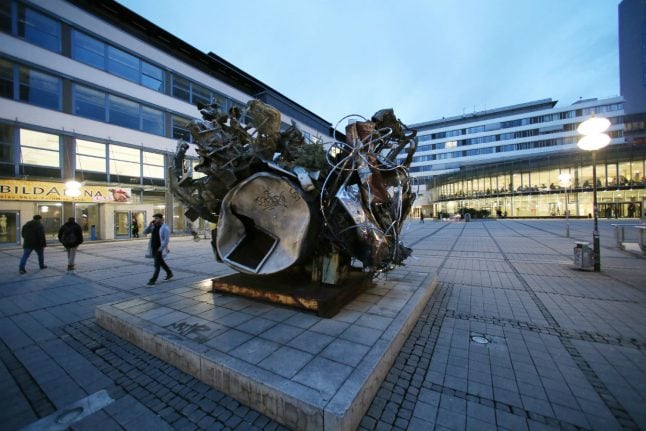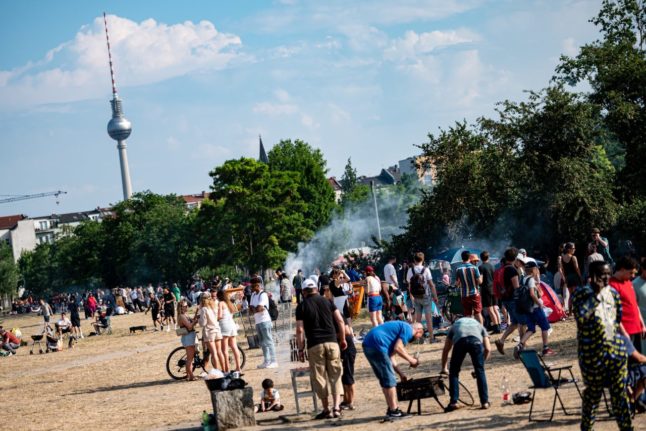1. Forget the applause, you simply knock.
Now, you may be sitting in class, waiting for a lecture to end, and as a normal instinct prepare to praise this presentation with an applause. However, you quickly stop and realize that everyone else around you are simply knocking on their table with their fists.
Strangely, this is just a normal German academic tradition, which is also called “Akademisches Klopfen” (academic knocking) and simply recognized as a more reserved way of applauding. The same rule is often applied at conferences or readings, especially If they are led by an academic institute.

Students praising the lecturer with the “Akademisches Klopfen” Photo: Depositphotos/Wavebreakmedia
You might find yourself making the mistake at least two or three more times, as you get ready to burst into applause after that epic biology lecture. But don't worry, you'll get the hang of it soon enough.
2. “Sie”-ing on the safe side
In many places around Europe, such as in Norway or Sweden, your professor or tutor is just like a mate, often referred to by their first names. In Germany, however, it’s the norm to refer to your professors in a formal matter using “Herr” or “Frau” before their surnames.
Instead of a taboo “Du”, you would stick with “Sie.” With some German professors you might get lucky and avoid being as formal, but to stay on the safe side, start out with a “Sie”.
3. Being as independent as possible
In other countries such as the UK, you often have meetings with your tutors to monitor how you are progressing in your classes or with your studies. Yet in Germany, you have to be independent, the prized academic norm. This level of independence teaches you creative tricks and techniques, which you may not learn otherwise. For instance, you learn to trust yourself enough to believe that you will nail that exam – and develop the self-studying techniques to make it happen.
4. Please don’t be late, otherwise you´ll be met with glares.
Punctuality is a large part of German culture, and highly appreciated by Germans. Which is why, if you are planning to be just a little bit late, you should plan otherwise. However, if there really is a convincing reason for you to show up late (such as an Asteroid falling outside of your home) you should at least write an e-mail, unless you really want to be met with some painful glares.
Easier explained, just do not be late. Or better yet, plan to be in class 10 minutes early to be sure to be on time.

Photo: DPA
5. See you in “Mensa”
If you´re studying at any German university, you'll probably hear your friends saying they'll be chilling around Mensa or taking a quick lunch break there. Mensa is just the German word for Cafeteria. In Germany, the “Mensa” is large part of the university culture, which is also why you'll probably find some of your co-students or your German friends clustering around there between studying cram sessions. You would think that some nearby coffee shop would be much more interesting, but no, Mensa it is.
6. Welcome week! Were you expecting loads of parties? Well, expect a bit less.
If you were anticipating a week packed with parties and fun, well, that’s sadly not how this week works in Germany. This so-called welcome week is usually consists of five days full of information and guided tours on campus. Although there are a sprinkling of social events, the main focus of this week is for you to gather as much information as possible and to not get lost on campus. Nonetheless, when the tours and information sessions come to an end, you'll end up in a bar and socialize for a bit. If you have the energy left.
7. Who doesn’t love a bargain?
As a student in Germany, there will be one bargain after another. Lovely right? Students in Germany normally pay a tuition fees around €250 to €300. This fee, however, does not only cover your tuition. You also receive a semester ticket which grants you full access to public transportation. Additionally, this semester-ticket does not only let you roam around the different German cities, but it can score you discounts on everything from food, shopping or tickets to museums.

Photo: DPA
Yep, in Germany you´re one lucky student! Although there are many things to take care of as a student, the Germans are nice enough to give you something back. With all the patience of being super independent and formal, and of course avoiding the applause, you can treat yourself to a little discount at the end of the day.





 Please whitelist us to continue reading.
Please whitelist us to continue reading.
Member comments